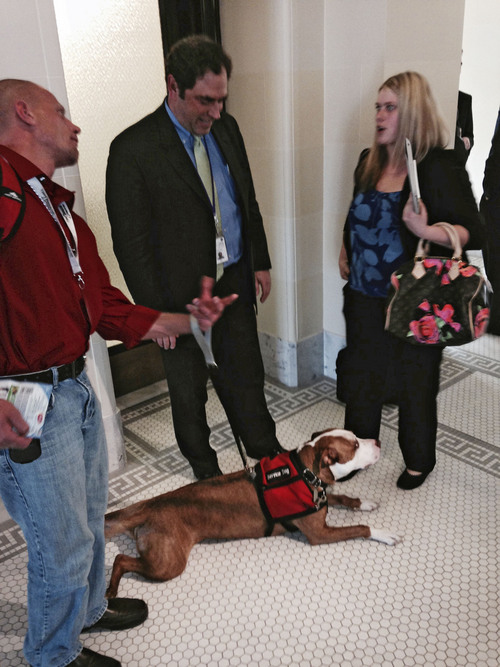This is an archived article that was published on sltrib.com in 2014, and information in the article may be outdated. It is provided only for personal research purposes and may not be reprinted.
Rep. Brian King told Monday how one unpopular group after another has been targeted by unfair discrimination in Utah, including being forced to leave some cities or be killed.
The groups? German shepherd dogs, then Dobermans, Rottweilers and now pit bulls.
By a 6-5 vote, he persuaded the House Political Subdivisions Committee to pass his HB97 to ban counties, cities and towns from outlawing specific breeds of dogs within their boundaries. The dog fight now moves to the full House.
The main opponent was the city of South Jordan — the largest of 10 Utah cities that bans pit bulls — and the Utah League of Cities and Towns. They argued the state should not micromanage them on such ordinances.
King, D-Salt Lake City, argued "this is one of those instances where it is necessary" because breed-specific bans have been denounced by an overwhelming number of groups from the Humane Society to the American Veterinary Medical Association, the Best Friends Society and the National Animal Control Association. Seventeen states also ban such ordinances.
"In any breed of dog, you find particular dogs that are more aggressive. It doesn't matter if you are talking about poodles or Shih Tzus," King said. He added that banning a breed stigmatizes all its members no matter how gentle an individual is — and it makes adopting them more difficult.
"Some of you can remember the day when it wasn't pit bulls. It was German Shepherds. They were associated with World War II and Germans and being attack dogs. That went out of style. Then it became Dobermans and Rottweilers. They were the stigmatized breed," he said. "Now it's pit bulls."
King argued that handling aggressiveness should be on an individual dog-by-dog basis. He may have been aided by a gentle-looking pit bull service dog panting quietly in the hearing room.
Chuck Dawson, intergovernmental affairs director for South Jordan, said his city banned pit bulls after a 1997 attack on a girl walking home. "An alligator could not have done more damage," he said.
"We do not regulate pit bulls because of their potential to bite. We regulate pit bulls because of their potential to inflict 52 percent more fatalities" according to a study by the Centers for Disease Control, he said. But Rep. Mike Kennedy, R-Alpine, noted that the CDC does not back breed-specific laws.
Committee Chairman Curt Webb, R-Logan, voted against the bill, even though he said breed-specific bans "make no sense at all" and he would fight them in his own city. "But should we as the Legislature dictate to these cities that these sorts of ordinances are prohibited? I'm really uncomfortable with that."



